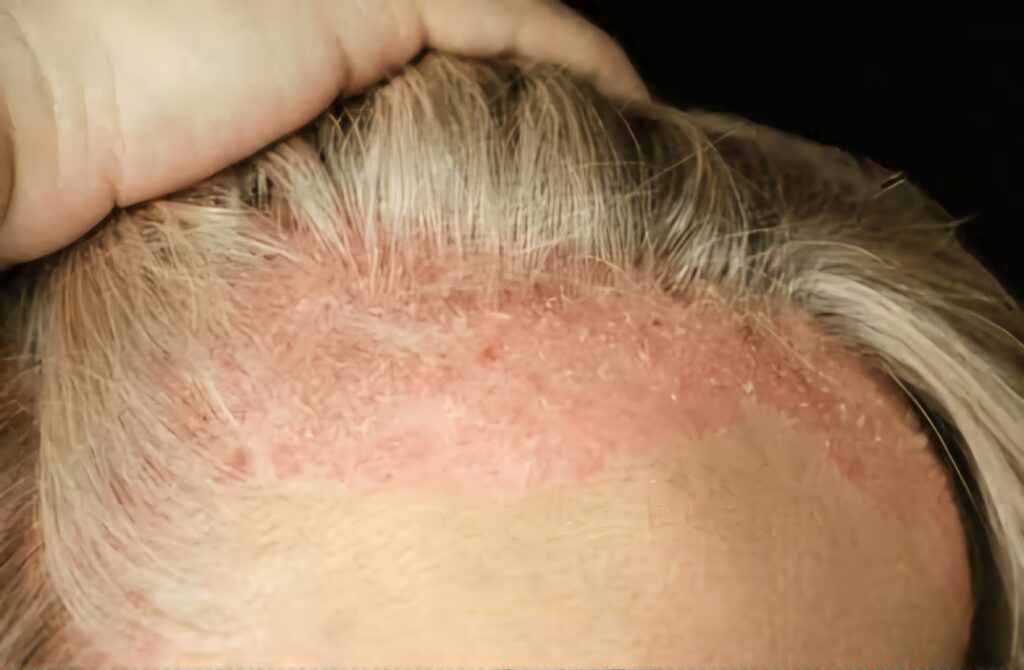
Millions of people worldwide suffer from the persistent skin ailment known as scalp psoriasis. It causes red, scaly patches, itching, and discomfort on the scalp. This condition is not contagious but can be persistent and challenging to manage. Understanding the scalp psoriasis causes and treatment options can help you find relief and improve scalp health.
So basically, psoriasis in the scalp is a type of autoimmune disorder that speeds up the growth cycle of skin cells. This leads to the accumulation of thick, scaly patches on the scalp. It can spread to the forehead, ears, and neck if not treated properly. The severity varies from mild flaking to severe scaling with painful cracks.
Scalp Psoriasis Causes
Psoriasis on the scalp occurs when the immune system mistakenly attacks healthy skin cells. This triggers an overproduction of new cells, leading to inflammation, redness, and scaling. This condition has multiple contributing variables.
- Genetic Factors
Psoriasis in the scalp often runs in families. If a close relative has it, you have a higher risk of developing the condition. Specific genes linked to the immune system may trigger psoriasis.
- Infections
Bacterial or viral infections, especially strep throat, can trigger scalp psoriasis in some people. These infections activate the immune system, leading to flare-ups.
- Immune System Dysfunction
Psoriasis is an autoimmune disease where the immune system overreacts. It speeds up skin cell production, leading to scaly, inflamed patches on the scalp.
- Stress and Anxiety
High-stress levels can weaken the immune system and trigger psoriasis flare-ups. Emotional distress often worsens existing symptoms.
- Hormonal Changes
Hormonal fluctuations, especially during puberty, pregnancy, or menopause, can contribute to psoriasis development.
- Weather Conditions
Cold, dry weather worsens scalp psoriasis by reducing moisture levels in the skin. Hot and humid weather may also trigger flare-ups in some individuals.
- Skin Injuries
Cuts, burns, or even harsh hair treatments can trigger Koebner’s phenomenon, where psoriasis develops in injured areas.
- Medications
Beta-blockers, lithium, and antimalarial medications are among the pharmaceuticals that might cause or exacerbate psoriasis.
Symptoms of Scalp Psoriasis
The symptoms of scalp psoriasis vary in severity. Some people experience mild scaling, while others develop thick, painful plaques. Common symptoms include:
– Thick, silvery-white scales cover red, swollen areas.
– Dry, flaky scalp that resembles severe dandruff
– Itching and burning sensation
– Painful cracks or bleeding in severe cases
– Hair loss due to excessive scratching or inflammation
While scalp psoriasis does not directly cause permanent hair loss, excessive scratching, inflammation, or harsh treatments can lead to temporary hair thinning. If these signs worsen over time despite using over-the-counter treatments or cause significant discomfort, it’s best to consult a hair specialist in Delhi at the Anti-Aging Centre. Psoriasis on the scalp requires advanced, personalized care, and a specialist can recommend tailored treatments to help manage symptoms and prevent flare-ups.
Scalp Psoriasis Treatment
Psoriasis in the scalp requires a combination of medical treatments, lifestyle changes, and proper scalp care. Treatment aims to reduce inflammation, slow down skin cell growth, and relieve discomfort.
- Topical Treatments
Topical treatments are the first line of defense for mild to moderate scalp psoriasis.
- Corticosteroid Creams
Corticosteroids reduce inflammation and redness. They are available in creams, foams, and scalp solutions. These should be used under the supervision of a hair specialist doctor in Delhi to prevent side effects.
- Salicylic Acid
Salicylic acid helps remove scales and soften plaques. It is commonly found in medicated shampoos and scalp treatments.
- Vitamin D Analogues (Calcipotriol)
Vitamin D-based treatments help slow down excessive skin cell production. They are often used alongside corticosteroids for better results.
- Medicated Shampoos
Special shampoos prescribed by your dermatologist can effectively manage scalp psoriasis by reducing scaling, itching, and inflammation. Common ingredients include ketoconazole, which helps reduce flaking; zinc pyrithione, known for its anti-inflammatory properties; and salicylic acid, which exfoliates dead skin. Additionally, using a gentle, sulfate-free shampoo prevents further irritation, making it easier to control symptoms and maintain scalp health.
- Phototherapy (Light Therapy)
Light therapy is an effective treatment for moderate to severe scalp psoriasis, involving UVB light exposure to slow skin cell production and reduce inflammation. Excimer laser therapy targets specific areas of the scalp, leaving healthy skin unaffected. Additionally, controlled exposure to natural sunlight can also help manage symptoms of scalp psoriasis, providing a natural option for individuals with scalp psoriasis. This approach, when combined with other treatments, can significantly improve scalp health.
Some Lifestyle Changes
In addition to medical treatments, lifestyle changes can help manage scalp psoriasis. Moisturizing the scalp with oils like coconut or jojoba helps prevent dryness. Gentle hair care, a diet rich in omega-3s, and stress management techniques like yoga and meditation can further reduce flare-ups and improve overall scalp health.
Conclusion
Scalp psoriasis is a chronic but manageable condition. Understanding the scalp psoriasis causes and treatment options can help you take control of your scalp health. Medical treatments like topical creams, medicated shampoos, and phototherapy can relieve symptoms. Lifestyle changes, proper scalp care, and stress management also play a crucial role. If symptoms persist, consulting a hair specialist doctor in Delhi at TAC can provide expert guidance for long-term relief.
